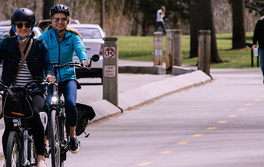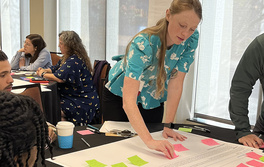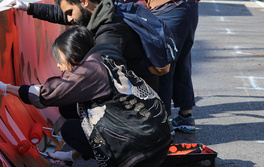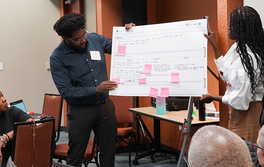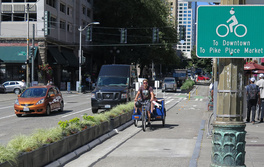
RELEASE: NUMO Alliance Celebrates Achievements of 2019 & Announces New Tools for Harnessing Urban Mobility Disruptions
WASHINGTON, DC (January 30, 2020) — On January 14, 2020, members of NUMO, the New Urban Mobility alliance, gathered in Washington, D.C., to address the opportunities and challenges involved in creating sustainable, equitable and accessible transportation in cities during an event hosted by NUMO, Populus and Urbanism Next.
As incubators of new mobility, including micromobility modes and app-based ride-hailing, cities have been ground zero for major global change. “We have the opportunity with these disruptive technologies to completely reshape the urban landscape… but the question is how,” said Congressman Earl Blumenauer, a representative of Oregon’s third district and committed advocate for livable, sustainable cities.

The question remains, Rep. Blumenauer continued, whether these innovations will increase congestion, feed sprawl, and exacerbate the carbon footprint, or if we will be purposeful in using technology to solve existing problems.
Cities have the opportunity to become more livable and sustainable with the assistance of tech-based disruptions in transportation, but they must first articulate “the kind of places they aspire to be and the kind of outcomes they expect from changes in mobility,” said NUMO director Harriet Tregoning.
The Shared Mobility Principles for Livable Cities provide a starting point for cities to define those needs and desires. Developed in 2018 by NUMO co-founder and former CEO of Zipcar Robin Chase and a consortium of international NGOs, the Shared Mobility Principles are designed to guide urban decision makers and stakeholders toward the best outcomes for all. As an outgrowth of the Principles, NUMO works to realize these outcomes through collaborative partnerships and aligned action among city governments, private mobility services, academic institutions, tech companies and NGOs.
The alliance’s work is made more necessary by the urgency of the climate crisis. The transportation sector is the primary source of greenhouse gas emissions in the United States and accounted for over 24% of global CO2 emissions in 2016. Emissions from the transport sector are expected to grow at a rapid rate.
Since launching in January 2019, NUMO has led research efforts; guided pilot initiatives in cities including Pittsburgh, King County, Washington, D.C., Guadalajara and Bogotá; convened stakeholders on the topics of mobility data, transport service market entry and regulations for new mobility; and developed open, creative resources to spark discussion about how to build better cities and change the way we think about urban transport.
NUMO announced new tools and resources during the event, including MoMobility, a new card game designed spur discussion and reshape attitudes about urban mobility and design, and the NUMO New Mobility Atlas, an extensive platform that visualizes the proliferation of new mobility services in cities around the world.

The New Mobility Atlas was co-developed with e-scooter operator Grin, mobility-as-a-service NGO MaaS Latam and Populus, a mobility data platform committed to helping cities and private operators deliver safe, equitable and efficient streets. Speaking at the event, Populus founder and CEO Regina Clewlow said that “cities are really starting to assert how they would like to see the transportation ecosystem evolve,” and that the company is excited to be working in over 50 cities around the world to manage shared mobility services.
The event also marked the launch of ‘The NEXUS’, a centralized public source of knowledge on emerging technologies and their impacts on cities. The platform is an initiative of the Urbanism Next Center at the University of Oregon and was developed with support from NUMO and a technical advisory committee of subject matter experts.
“Changes are coming fast, and new technologies are forcing cities to rapidly evolve,” said Nico Larco, director of the Urbanism Next Center. “When faced with the challenges and opportunities that these new technologies pose, The NEXUS helps cities and decision makers understand how to frame conversations and provides a trustworthy, fact-based platform to gather all of the information they need to tackle these issues.”
Additionally, online platform Streetmix shared its free tool for users to design, remix and share digital streets, including new elements created in partnership with NUMO.
In 2020 and beyond, NUMO hopes to strengthen the alliance and continue to work collaboratively with the public and private sectors to create joyful cities where sustainable and just mobility is the new normal.
###
NUMO is a global alliance that channels tech-based disruptions in urban transport to create joyful cities where sustainable and just mobility is the new normal. Founded in 2019 as an outgrowth of the Shared Mobility Principles for Livable Cities, NUMO convenes diverse allies and leverages the momentum of significant revolutions in mobility to target urban issues — including equity, labor, governance, safety and data privacy — impacted by the shifting transportation landscape. NUMO is hosted by WRI Ross Center for Sustainable Cities. For more information, visit www.numo.global.
Media Contact
Madlyn McAuliffe
Header image: Davsot/Flickr
